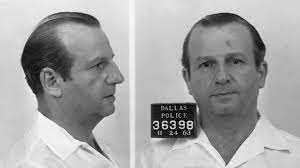Jack Ruby, born Jacob Leon Rubenstein in 1911, is a name etched in the annals of American history for one fateful act that changed the course of the nation’s collective memory. Ruby is infamous for shooting Lee Harvey Oswald, the alleged assassin of President John F. Kennedy, on live television in 1963.
Before that pivotal moment, Ruby had a relatively low-profile existence. Born to Polish immigrants, he grew up in Chicago and later moved to Dallas, where he operated strip clubs and was known to have connections with the criminal underworld. It was in this murky milieu that he would cross paths with Oswald.
On November 24, 1963, just two days after Kennedy’s assassination, Ruby shot Oswald in the basement of the Dallas Police Department. The act was witnessed by millions on live television, adding another layer of complexity to an already convoluted national tragedy. Ruby claimed he was motivated by a desire to spare Jacqueline Kennedy the anguish of enduring a lengthy trial, but conspiracy theories quickly emerged.
Ruby’s trial raised more questions than answers. He was convicted of Oswald’s murder but maintained his innocence, asserting that he was a pawn in a larger conspiracy. Before any new evidence could emerge, Ruby died of lung cancer in 1967, leaving a trail of speculation and intrigue.
Ruby’s actions remain a subject of debate and speculation in American history. Was he a lone actor driven by a personal vendetta, or was he part of a larger conspiracy to silence Oswald and keep the truth hidden? The enigma of Jack Ruby persists, a symbol of the complex and mysterious aspects of one of the most tragic events in American history.
newshub



Recent Comments